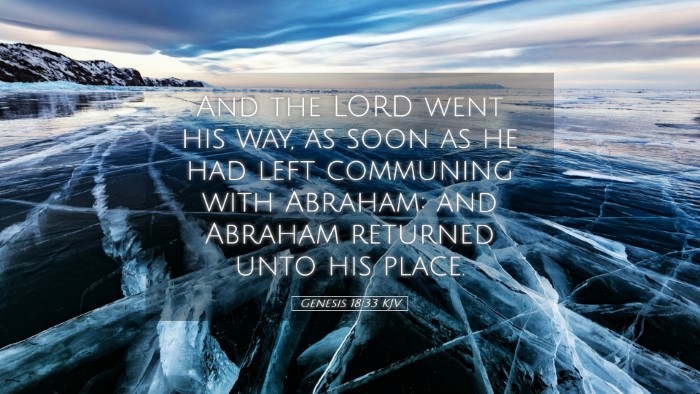Commentary on Genesis 18:33
Verse: "And the LORD went His way, as soon as He had left communing with Abraham: and Abraham returned unto his place." (Genesis 18:33, KJV)
Introduction
This verse marks the conclusion of a significant dialogue between God and Abraham, where Abraham intercedes for the cities of Sodom and Gomorrah. The import of this conversation is profound, not only for understanding divine justice but also for illustrating the role of intercession and negotiation in prayer. This commentary synthesizes insights from renowned public domain scholars like Matthew Henry, Albert Barnes, and Adam Clarke to delve deeper into the meanings and implications of this verse.
Theological Insights
Divine Sovereignty and Human Agency: The interaction between God and Abraham showcases the tension and harmony between divine sovereignty and human agency. God engages with Abraham, indicating a willingness to hear the pleas of humanity. Abraham's negotiation demonstrates a critical faith and courage to approach God on behalf of others. This reflects a larger theme in Scripture where God allows His purposes to be influenced by the prayers and intercessions of His people.
Commentary Breakdown
1. The Nature of God’s Dialogue
Matthew Henry emphasizes the relational aspect of God's communication. He notes that God condescended to speak with Abraham, highlighting God's desire for relationship and dialogue with His creation. This exchange illustrates that God is not distant or unapproachable but invites His people into conversation, allowing them to engage in matters of righteousness and mercy.
2. Abraham's Role as Intercessor
Albert Barnes points out that Abraham's intercession signifies the importance of standing in the gap for others. There is a dual lesson: the necessity of recognizing the sinfulness of Sodom and Gomorrah and the underlying hope in God's mercy. Barnes argues that Abraham models a righteous engagement with God—pleading with respect, humility, and yet boldness. The plea for the righteous among the wicked brings to light the nature of God's justice: He is willing to spare entire cities for the sake of a few righteous individuals.
3. The Significance of the Concluding Statement
Adam Clarke highlights the weight of the last statement in the verse: "and Abraham returned unto his place." This return signifies completion, a resolution of the dialogue, and a return to the earthly realm after having engaged in profound heavenly matters. Clarke suggests that this moment can be seen as a transition from the spiritual exercise of intercession back into the everyday life of faith. Abraham, like all believers, returns to the normalcy of life with a renewed commitment to trust in God's justice and mercy.
Practical Application
The lessons derived from Genesis 18:33 are manifold for pastors, students, theologians, and Bible scholars:
- Intercessory Prayer: This narrative highlights the power and importance of intercession in the life of a believer. The faithful are called to pray not only for themselves but for cities, communities, and nations, trusting that God hears and responds.
- Understanding God’s Character: A close examination of this dialogue reveals God's patience, justice, and mercy. Believers are encouraged to understand God's nature deeply, to approach Him with confidence in His character.
- Engagement with the World: Like Abraham, Christians are called to be engaged with the world around them, advocating for righteousness and calling upon God's mercy. This engagement requires both discernment and a compassionate heart.
Conclusion
Genesis 18:33 encapsulates a profound moment of interaction between God and Abraham. While it marks the end of a specific dialogue, it opens the door to broader discussions about the nature of prayer, intercession, and divine justice. The insights from Matthew Henry, Albert Barnes, and Adam Clarke collectively remind readers of the richness in the text and the invitation for believers to engage deeply with God while living out their faith in the world.


